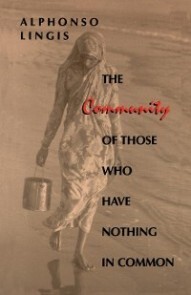" . . . thought-provoking and meditative, Lingis's work is above all touching, and offers a refreshingly idiosyncratic antidote to the idle talk that so often passes for philosophical writing." -Radical Philosophy
" . . . striking for the clarity and singularity of its styles and voices as well as for the compelling measure of genuine philosophic originality which it contributes to questions of community and (its) communication." -Research in Phenomenology
Articulating the author's journeys and personal experiences in the idiom of contemporary continental thought, Alphonso Lingis launches a devastating critique, pointing up the myopia of Western rationalism. Here Lingis raises issues of undeniable urgency.

